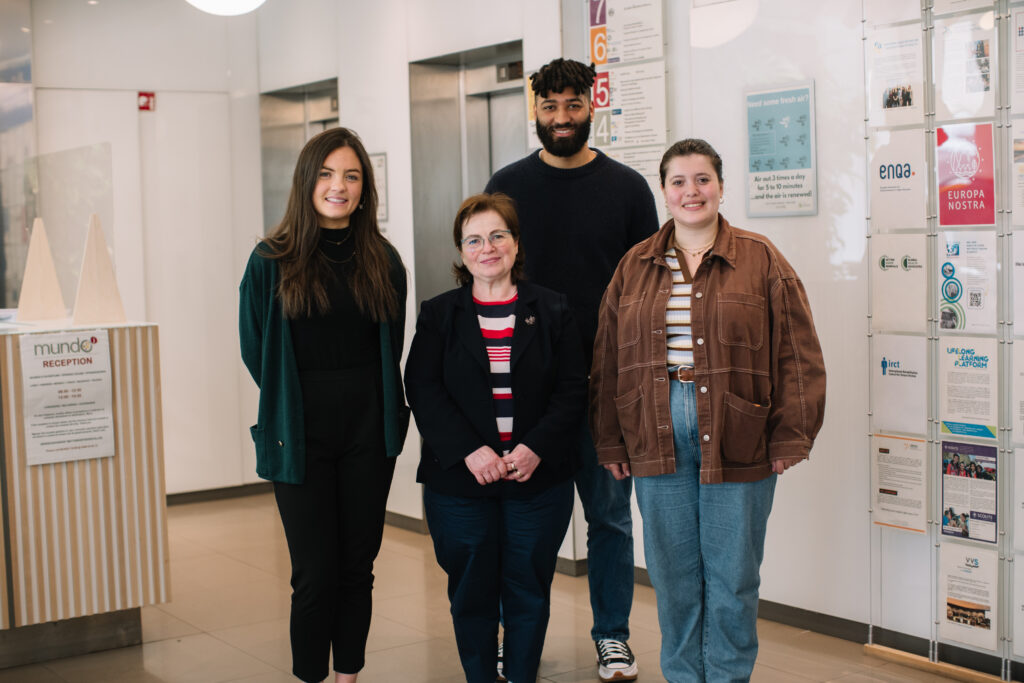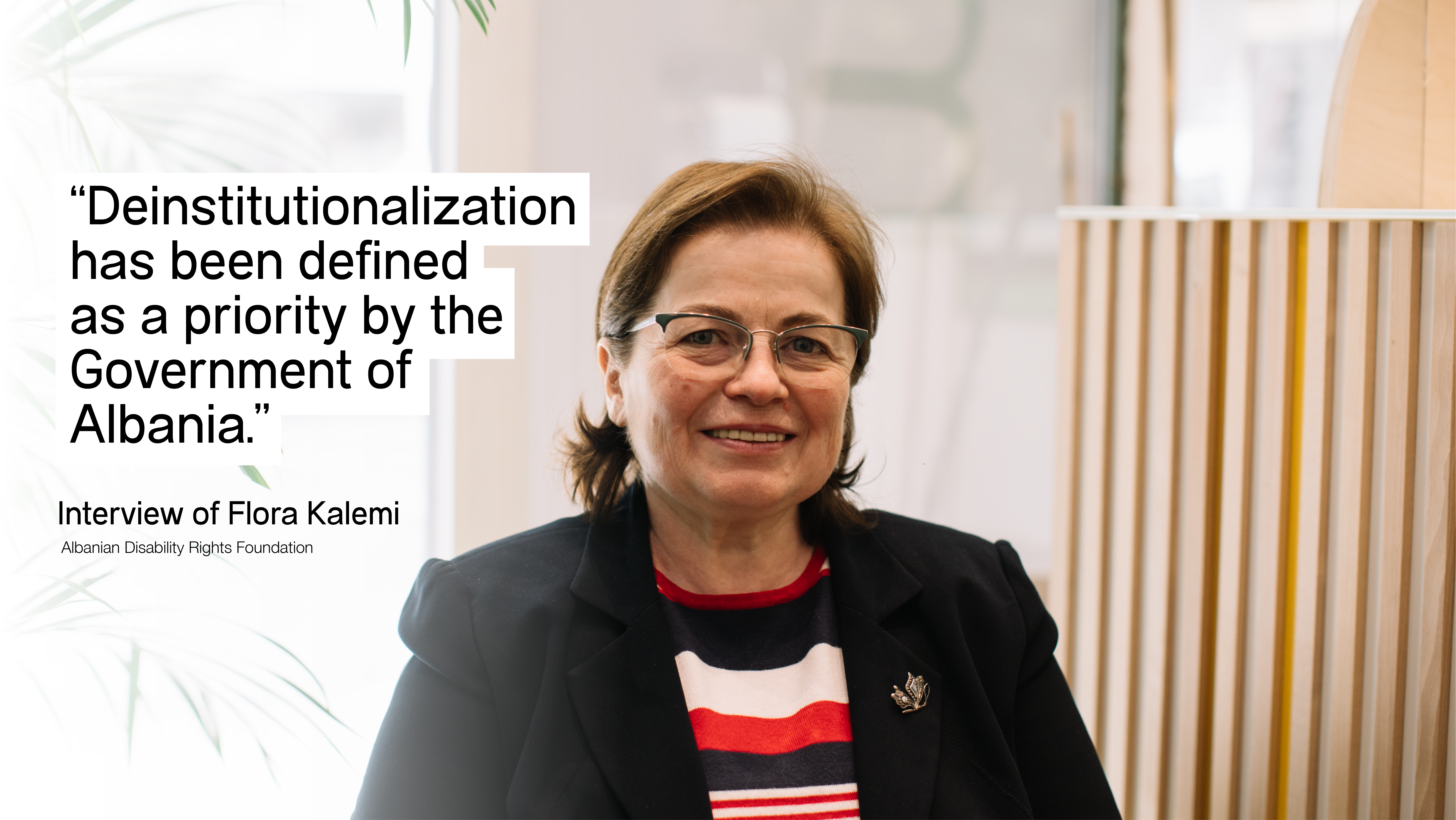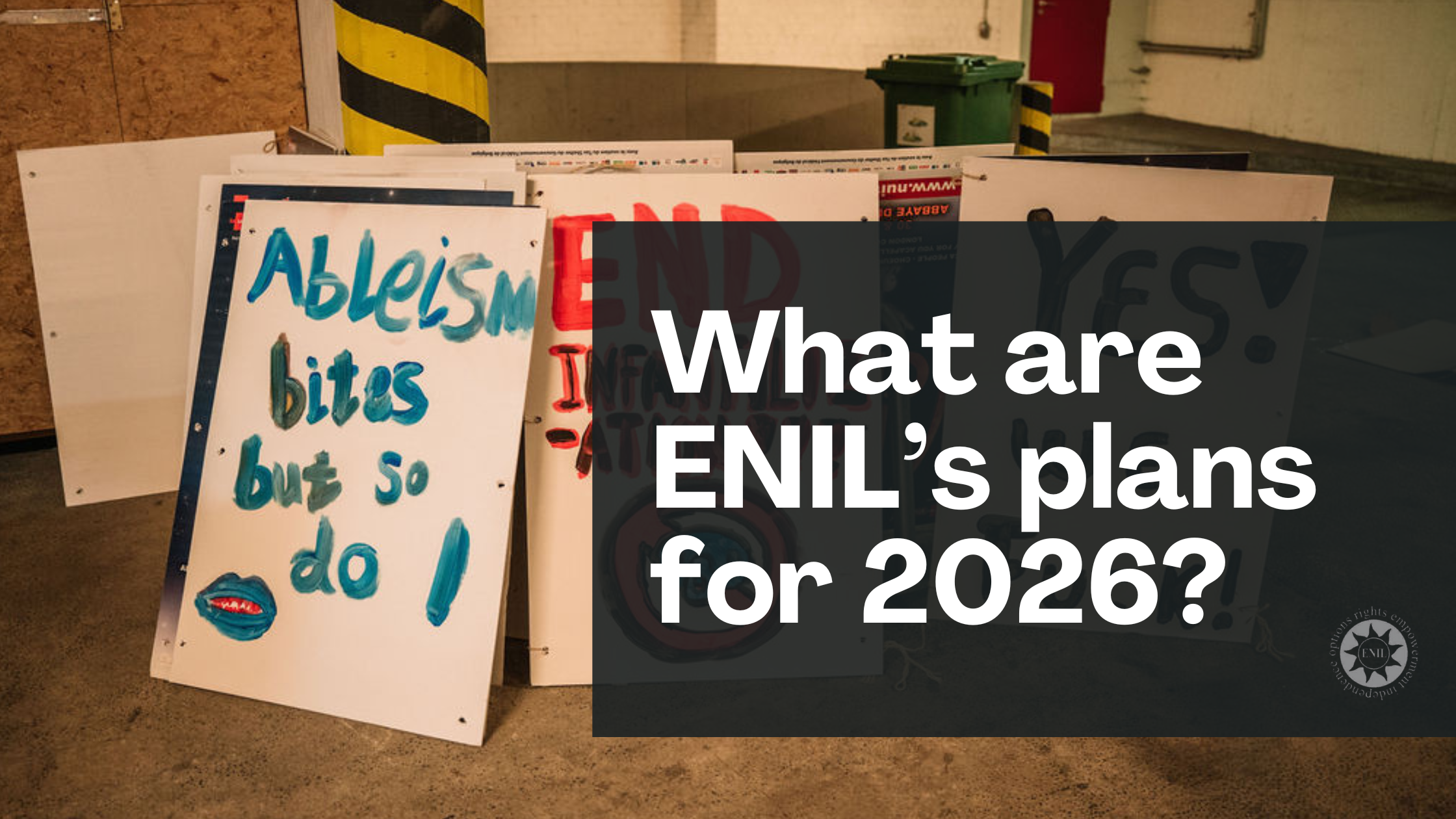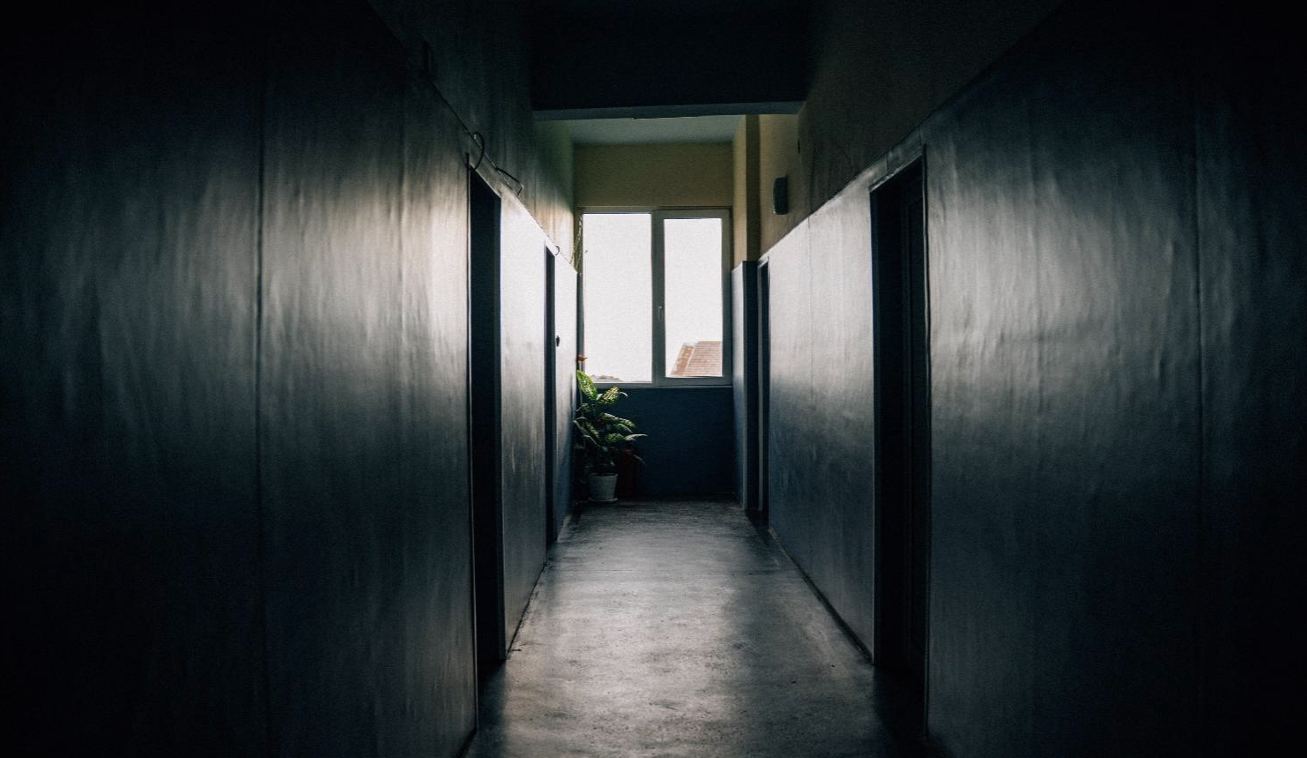On 25 May 2023, we were visited by Flora Kalemi from the Albanian Disability Rights Foundation (ADRF). We were able to share many things and discuss different aspects of independent living in Albania, as well as the challenges faced by the ADRF. Flora Kalemi also agreed to let us ask her a few questions, so that you could learn more about the fight for independent living in Albania. You’ll find the interview below.
Interview of Flora Kalemi, ADRF
1. Who are you and where are you from?
My name is Florida Kalemi, I am Albanian and live in Tirana, Albania. Graduated University of Tirana, Faculty of Foreign Languages/ English Branch; Diploma from HREA Distance Learning Program on Human Rights, in Netherlands, subject area “Research and Evaluation in NGO sector,” with lot of qualifications in social work, lobbing and advocacy, research and evaluation in NGO sector, community services for persons with disabilities, including information services, free legal aid, supported employment services for persons with disabilities etc. , disability and development issues. As program coordinator at ADRF(Albanian Disability Rights Foundation) , for round 25 years, have been actively involved in activities in the area of advocacy and lobbying for disability related policy and legislation adoption and monitoring their implementation, and provision of supportive services for persons with disabilities in need throughout the country.
2. Could you introduce us to the work of Albanian Disability Rights Foundation (ADRF)
Albanian Disability Rights Foundation (ADRF), a cross disability organization, was established in 1996 to promote equal opportunities and improve the quality of life of persons with disabilities (PWD) and their family members in Albania. ADRF’s main headquarters is in Tirana, the capital of Albania, but its presence and impact through its programs is spread throughout the country. With a team of PWD and disability experts, ADRF has partnered with DPOs, CSOs, donors, and government to provide disability services including: (i) Disability Rights Resource Center, which offers information, training, research, lobbing & advocacy, as well as educational programs targeting all relevant stakeholders and the general community; (ii) Employment Support, which guides PWD and advises private companies and the Government; (iii) Free legal aid and strategic litigation; and (iv) Wheelchairs and other mobility devices. A cross-cutting goal of ADRF is to highlight the intersection between gender and disability. It has initiated the establishment of the Disability and Development Coalition in Albania (DDCA) and is a member of national and international networks focused on disability but also networks on Child’s rights, Women’s Network on Violence against Women; Access to Justice network etc.
3. What are the challenges your organization faces in Albania
As all civil society sector in Albania, ADRF is relying mostly in donor’s funding, which makes sustainability of programs an issue. There is no core funding available, but only project based financial support.
4. What are some of the key achievements you have made?
ADRF is recognized as a leader in promoting human – rights based approach and transforming attitudes and influencing adoption of over 25 acts of disability inclusive policies and legislation, through research based and self-advocacy, like improvements in the electoral code to enable the right to vote for persons with disabilities, improvement of legislation that enables inclusive education, accessibility, design and approval of the first comprehensive National Disability Strategy, lobbing & advocating for pushing the Albanian Government to ratify the CRPD etc. amendments to the law on promoting employment etc. In addition to that ADRF. It is also contributing in providing innovative services, like free legal aid, wheelchair service and supported employment services for persons with disabilities.
5. What is the situation of independent living in Albania (e.g., personal Assistance, deinstitutionalization, accessibility in public transports, etc.)?
The results of the 2011 Population and Housing Census by INSTAT, show for increased incidence of disability, at 6.2% of the Albanian population above the age of 15 as compared to the previous official figure of total of 3.8%, failing to get exact data on children with disabilities. A current survey of World Vision1 on prevalence of disability amongst children, shows for an incidence of 10% of children with disabilities amongst children.
The Law 93/20142 “On the social inclusion and accessibility of persons with disabilities” for the first time makes provisions about independent living for persons with disabilities and specifies also the services that need to be provided, in order for persons with disabilities to enjoy this right. But little, almost nothing is done in practice to realize independent living. Independent living for persons with intellectual disabilities is coupled with a variety of barriers: lack of services for independent living; lack of supported decision making; fear and disbelief about the skills from the part of their family and others; economic difficulties, little employment opportunities; alternatives that they have available for habitation, abandonment by family, etc. are among the main factors influencing the opportunities for them to live an independent life, enjoy a healthy emotional state, not be discriminated against and not isolated.3 So far, only the Council of Ministers’ Decision No. 1074, dated 23.12.20154 “For defining actions for the elimination of barriers in communication and infrastructure in offering public services for persons with disabilities” has been approved, but no significant progress has been made to eliminate barriers, which in turn obstruct independent living. In 2015, the Municipality of Tirana after a long time provided social housing opportunities and part of the beneficiaries were also persons with disabilities. The social housing buildings were inaccessible, and the disability beneficiaries handed back the keys of the apartments as they could not make use of them.
Article 8 of the Law “On social inclusion and accessibility of persons with disabilities” provides for the service of the personal assistant and a Council of Ministers’ Decision is approved to ensure its implementation. To this day, the state provides an amount of money which is round 100 Euro, (at a time when minimum salary is around 360 euro) for the service of “caregiving” to some categories of persons with disabilities. Being unable to employ someone with that amount of money, family members end up doing the job on their own. This service is also very paternalistic in nature and medical model oriented as the sum is designed to be withdrawn by the ‘caregiver’ which takes away choice and control from the person with disability.
The inaccessibility of the built environment, transport information and communication in Albania prevents persons with disabilities from actively and fully participating in society. Improving accessibility oftentimes meant putting a ramp in the entrance to guarantee access in the main hall, but disregarding completely if that same hall had different levels, or for reaching upper floors, accessible toilets, elements of accessibility for persons with visual and hearing impairments, etc. Only in Tirana there can be found buses that have ramps for wheelchair users but often overcrowding of the buses and bus stations that are not accessible make them impossible to be used by persons with disabilities. Urban and inter-urban bus lines in Albania lack completely itineraries’ tables or information in audio for people with visual impairments.
Article 9 of the law 93/2014 “On the social inclusion and accessibility of persons with disabilities” provides for assistive devices, but so far, nothing has been done, with currently only partially supporting for the basic/ standard wheelchair.
Deinstitutionalization has been defined as a priority by the Government of Albania. It is noticed a tendency to return of children from public residential social care institutions to families, but the range of supportive community-based services is not yet available to meet the needs.
6. How does the government view the CRPD? Is it well considered? If not, what do you do to advocate for it?
The government of Albania has ratified the CRPD in December 2012, but it has not ratified its Optional Protocol. We need to advocate for harmonization of national legislation in some of the areas with CRPD, as well as for ratifying its Optional protocol.
7. Do you have something to add?
It was a great opportunity for ADRF to visit ENIL, under EU funded program “Dialogue for inclusive evidence-based policy development in Albania – ideAL” implemented by Co-Plan, Institute for Habitat Development in Albania, intending to assist its subgrantees, to build/strengthen dialogue/ partnerships with homologues organizations/institutions in one of EU countries, to enforce lobbing and advocacy for disability rights, and we strongly believe that as members of ENIL, will assist us to strengthen our lobbing and advocacy efforts, but also to share experiences and expertise with ENIL members in various countries, thus contributing together to making a real change in the lives of persons with disabilities in Albania.




